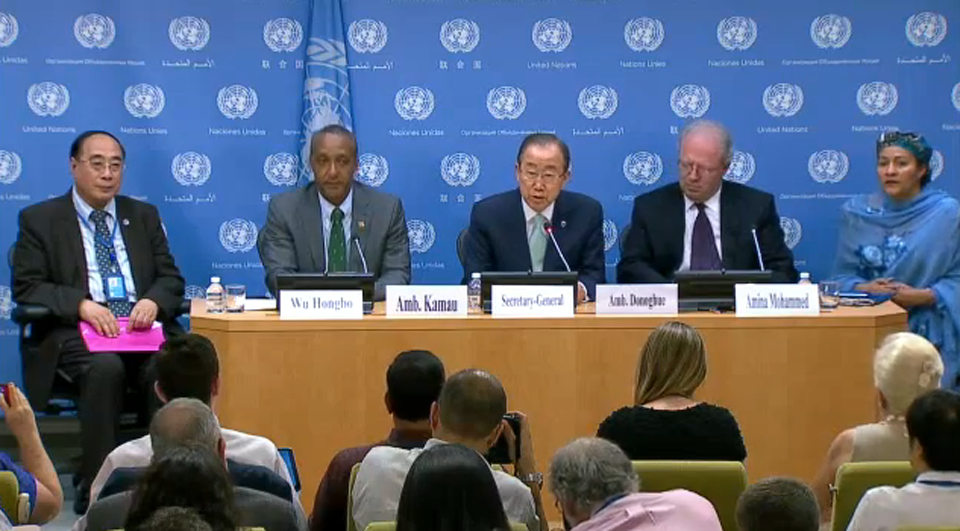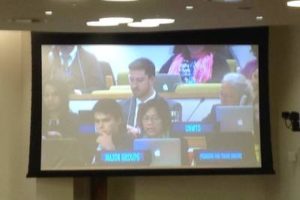IBON International Updates #4
Sustainable Development
[[{“type”:”media”,”view_mode”:”media_large”,”fid”:”1018″,”attributes”:{“alt”:””,”class”:”media-image”,”height”:”266″,”style”:”width: 350px; height: 194px; margin: 5px; float: right;”,”typeof”:”foaf:Image”,”width”:”480″}}]]
New York City, 3 August 2015 – On August 2, 2015, Ambassador Macharia Kamau of Kenya declared that delegates from 193 countries of the United Nations had finally arrived at a consensus behind a new development agenda for the next 15 years. After almost three years of consultations among various stakeholders and deliberations among Member States on a successor framework to the Millennium Development Goals (MDGs) that expire this year, a post-2015 development agenda was finally agreed after feverish negotiations that extended two days beyond the target date of completion.
Ambassadors Kamau and David Donoghue of Ireland co-facilitated this drawn out process to its completion and will now send the final text to the UN General Assembly for formal adoption by Heads of States and Governments in a Summit scheduled on September 25-27 at the UN Headquarters in New York City.
Delegates from Member States present last Sunday evening welcomed the outcome document titled “Transforming Our World: The 2030 Agenda for Sustainable Development”, with a standing ovation and sighs of relief.
Unheard in the applause, however, was the frustration over the non-transparent and unprincipled negotiating tactics applied by developed countries led by the United States and European Union during the final 48 hours of negotiations.
Behind closed-doors, developed countries were able to wrest more concessions on major issues of concern to developing countries.
CBDR circumscribed
As in other multilateral negotiations in recent years, the central point of contention among Member States in this process is the fair burden sharing of responsibilities. The G77 and China insist that the burden of achieving sustainable development should not be the same for all countries. Those who have developed their economies faster through colonialism and the overexploitation of the global commons should be expected to bear more in terms of providing finance, technology and technical capacity for transitioning to a more sustainable path of development for all. This is encapsulated in the principle of “Common But Differentiated Responsibilities” (CBDR) stated in the 1992 Rio Declaration on Environment and Development.
The US, EU and other wealthy countries belonging to the Organization for Economic Cooperation and Development (OECD) on the other hand insist that the Post-2015 Development Agenda must be a shared responsibility of all countries. They deny the heavier historical responsibility of the advanced industrialized countries and highlight the rapid economic growth and increase in climate-changing greenhouse gas emissions of China, Brazil and other so-called middle-income countries in recent years.
In the end, the US and other developed countries got their way. The CBDR is acknowledged only once and in a very circumscribed manner in the declaration of principles of the 2030 Agenda. Indeed, other parts of the document demonstrate the determination of the US and other rich countries to shift the burden of responsibility to developing countries and the private sector. For instance, the outcome document states, “Maintaining sustainable debt levels is the responsibility of the borrowing countries.”
Indeed there is nothing in the 2030 Agenda, nor in the outcome of the recently concluded Third International Conference on Financing for Development held last month in Addis Ababa, that commits developed countries to scale up public financing for sustainable development. Likewise absent are clear timebound commitments to reform or democratize the global governance of macroeconomic, financial, trade, tax, debt and monetary regimes in favor of developing countries. International financial institutions are merely prodded to respect policy space of countries but consistent with their organizational mandates – which are very much set by the developed countries.
Reneging on redistribution
While “reducing inequality within and among countries” remains one of the SDGs, the final week of negotiations saw the elimination of any reference to redistribution in the 2030 Agenda for Sustainable Development upon the insistence of the US. This is to avoids grappling with the extreme and unprecedented levels of wealth concentration today that not only undermines social cohesion, but also distorts democracy, skews political institutions in favor of elites, and perpetuates structural inequality, discrimination and exploitation that breed conflicts.
Rather than aim to redistribute at least part of the trillions of dollars in the hands of the wealthiest 1% through progressive taxation and other measures within countries and financial transfers between countries, the outcome document stresses the importance of domestic resource mobilization in financing this agenda. Moreover it asserts that this is “first and foremost generated by economic growth.” This is then used as the premise for appealing to the “creativity and innovation” of businesses and calling for “meaningful trade liberalization” under the auspices of the WTO.
Promoting the business sector
The US, Canada and EU also insisted on fully integrating the Addis Ababa Action Agenda (AAAA) into the Post-2015 agenda – either in the main text or as an Annex — so that the latter serves as the framework for the means of implementation of the SDGs. The AAAA places heavy emphasis on the role of the private sector and private finance in mobilizing resources through public-private partnerships and blended financing instruments. People’s organizations have heavily criticized this trend for socializing the risks while privatizing profits from investments in large infrastructure and other development projects.
The G77 and China managed to block the annexing and wholesale integration of the AAAA into the 2030 Agenda but the latter still welcomes and “recognizes that the full implementation of the Addis Ababa Action Agenda, is critical for the realization of the Sustainable Development Goals and targets.”
Avoiding accountability
While elevating the role of the business sector in development, the 2030 Agenda, like the AAAA, refrains from placing any constraints on the operations of the business sector or measures that would ensure private sector accountability. While the reference to the Guiding Principles on Business and Human Rights and standards of the International Labour Organization (ILO) are welcome, these merely serve as non-binding guidelines. The US, for instance, is party to only 14 of the ILO’s 189 labor conventions and two of its eight core conventions despite having a permanent seat on the Governing Board.
Many people’s organizations underscore the inadequacy of this especially in the light of existing WTO rules and provisions in free trade agreements currently being negotiated – all of which are more binding on governments – that buttress the power of large multinational corporations to circumscribe government policies which would affect their bottom line.
Indeed, for many civil society organizations, the weakest aspect of the 2030 Agenda is the absence of a strong accountability framework that would really put pressure on governments and international institutions to deliver on their promises. Moreover, the follow-up and review mechanisms outlined are purely voluntary in nature with minimal recognition of the role of civil society in monitoring and review.
Progress?
Nevertheless there are some parts of the 2030 Agenda that may help bolster people’s assertion of their rights particularly around gender equality and the empowerment of women and girls; on decent work and social protection; on non-discrimination; and a new multi-stakeholder Technology Facilitation Mechanism.
But people’s organizations are asking whether the positive aspirations expressed in the new Post-2015 Sustainable Development Goals will, in the end, be negated by the regressive elements within the 2030 Agenda for Sustainable Development as well as the broader neoliberal trends headlined by austerity, privatization, financialization, corporate empowerment and increasing state repression and militarization across the globe. #
_____________________________________________________________________
*IBON International engages in capacity development for human rights and democracy around the world. It strengthens links between local campaigns and advocacies to international initiatives and brings development issues from the international arena in a way that peoples’ organizations and social movements can engage with at country level.
For inquiries, kindly contact:
Paul Quintos at pquintos@iboninternational.org



